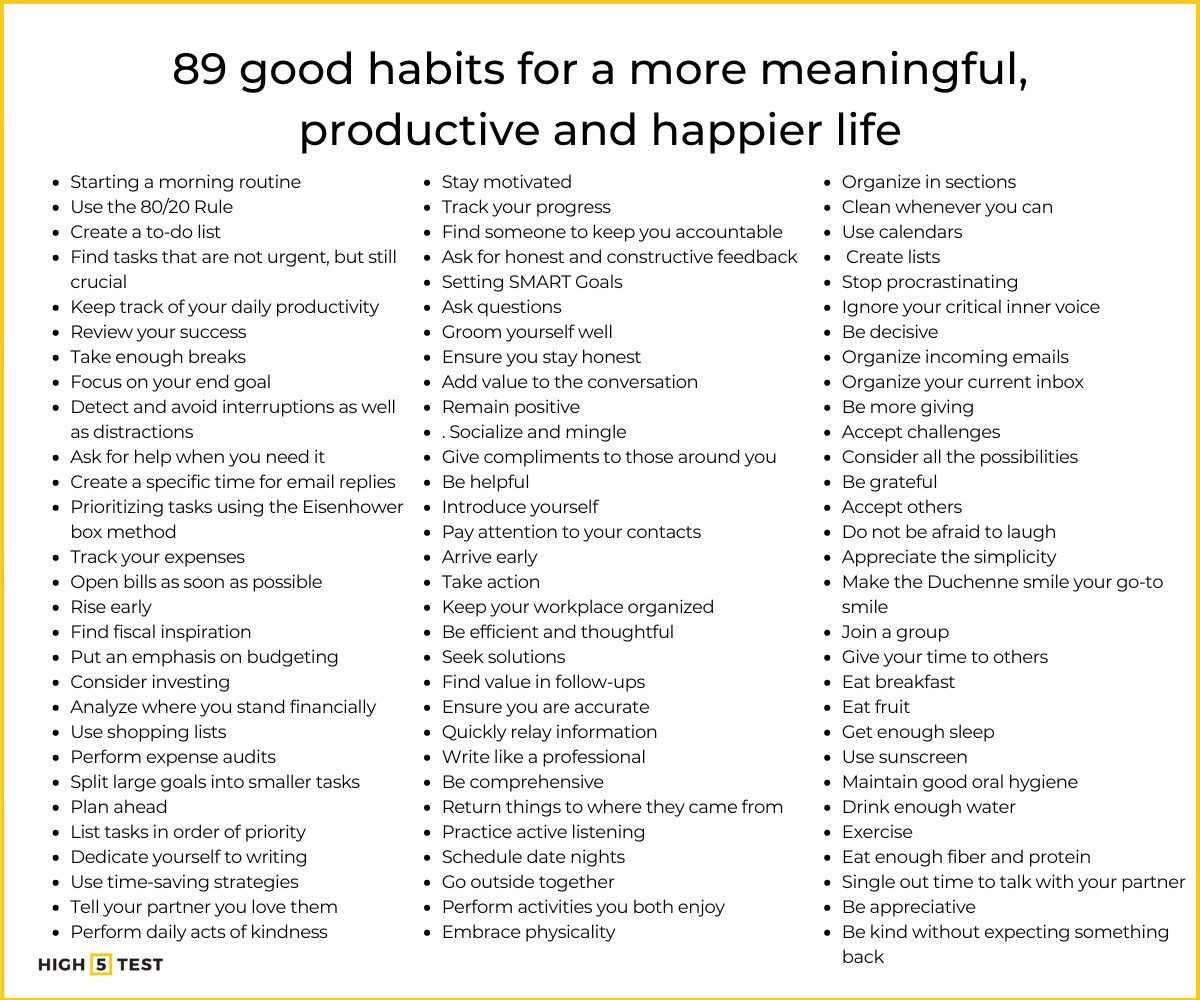Good habits can benefit you in a multitude of ways throughout your life.. Habits, in general, are learned or instinctual actions that you perform repeatedly. Daily habits can be both positive and negative. The key to transforming your life through habits lies in understanding your unique strengths. That’s where the HIGH5 test comes in. By identifying your top five strengths, this assessment guides you in cultivating habits that resonate with your natural abilities, making positive changes feel less like a struggle and more like a natural extension of who you are. Good habits help you perform well at work, succeed in your relationships, or achieve your goals. They may result in you gaining additional income, getting in shape, completing your daily to-do list, and a number of other positive benefits.
Over time, these actions become ingrained in your day-to-day life. The time it takes for a habit to manifest in your behavior varies between individuals, but on average, it takes approximately two months [1] – which, in the bigger picture, is not particularly long. Countless people struggle to overcome their bad habits and replace them with more productive ones. The good news is, everyone is able to change their behavior. In this article, we will provide you with a list of positive habits and the strategies you can apply to build these habits.
What are good habits?
Good habits are recognized as repetitive behaviors that are beneficial to you and your life. They build upon your strengths, contribute to career success, help you develop mental peace, or manage your chaotic life. There is almost always a positive outcome related to good habits. Common examples would include starting a daily self-care routine, exercising regularly, and eating healthy. Building good habits starts with small decisions. Making just one specific good choice daily could lead to a strong beneficial habit over time.
Do not try to overwhelm yourself by making a long list of habits you want to attain immediately, as this usually only results in decreased self-confidence – focus on creating short-term goals that are easy to follow up Good habits are most commonly maintained through a balanced approach to decision-making. Such habits are all-or-nothing. If your focus is on getting in shape, you can schedule a rest day in between your daily training. Or, you could splurge a little financially on the holidays even if your spending- and financial habits are usually strict. The key is to schedule these breaks or splurges for balance, so as not to get overwhelmed and lose your motivation
Why good habits are important?
In psychology, a habit is defined as a regularly repeated behavior that requires little or no thought and is learned rather than innate. They can range from sleeping to thinking patterns, and are developed through reinforcement and repetition, most often unconsciously [2]. One of the first to discuss the concept of habits was philosopher and psychologist William James, who in his 1890 famous The Principles of Psychology labeled habits as useful mechanisms to conserve higher mental processes for more demanding tasks.
However, they promote behavioral inflexibility [3]. If you incorporate detrimental habits in your daily life, you will be moving further away from success and happiness, making it harder to achieve your goals. On the other hand, good habits lead you in the opposite direction. You are more likely to achieve career success and meet your relationship goals.

10 benefits of implementing good habits
- Improves longevity and decreases the risk of serious ailments.
- Helps you reach your goals.
- Facilitates personal growth.
- Allows you to help your colleagues, partners, and community.
- Increases your overall quality of life.
- Replaces inefficient habits and reduces time-wasting.
- Reduces your reliance on outside motivation.
- Visualize a better future.
- Grow your strengths and work on your weaknesses.
- Gives you more energy.

Best productivity habits
Productivity is crucial to being a successful entrepreneur, manager, or employee. Being more productive in your daily routine could lead to a reputation within your company. Many successful people swear by certain productive habits as the key to their success. Such habits include:
1. Starting a morning routine
Each morning, perform the same productive tasks. This could include eating a healthy breakfast, go for a run, read the newspaper or an interesting book, or taking a cold shower to boost your metabolism [4].
2. Use the 80/20 Rule
This rule is known as the Pareto principle or the law of the vital few. Based on the work of Italian sociologist and economist Vilfredo Pareto, it was developed by management consultant Joseph M. Juran in 1941 [5]. The principle states that roughly 80% of results are yielded from only 20% of your effort. For instance, if you are a sales manager, consider the idea that 80% of sales come from 20% of customers.
Implementing the Pareto principle in your work- or daily life can help you find areas in which to focus your effort in order to be more productive and achieve maximum output. For instance, start your day by making a list of all the things you need to get done. This allows you to identify, categorize, and prioritize potential areas of improvement and problems that need to be solved [6].
3. Create a to-do list
Similarly, creating a daily to-do list is a simple and straightforward way to get an overview of tasks and routines that need to be completed. The tasks should be simple, achievable, yet relatively challenging. They can include for instance answering all the emails in your inbox, cooking a healthy meal from scratch, or taking a half-hour run in the evening. Although such tasks may sometimes seem like a hassle, accomplishing your daily goals can lead to achieving larger goals in the long term and once completed, it will give you a sense of gratification and self-confidence.
4. Keep track of your daily productivity
Many apps can track how productive you are at work. You can also track your own progress by making lists and marking off tasks in your calendar. This will help you identify when and why you procrastinate or get distracted, and provide a more solid foundation for creating the stepping stones needed to achieve your long-term goals. Over time, you can compare which strategies and environments best boost your productivity.
5. Take enough breaks
Taking breaks is essential for staying sharp and productive. If you find yourself immersed in your work, you might think a break is a waste of time. However, many studies show that short and small breaks may boost your focus and help your brain better manifest the knowledge you gain when learning a new skill [7]. You are also less likely to experience burnout if you implement ample breaks.
6. Focus on your end goal
While your goals may seem out of reach, tell yourself you can achieve them. Visualizing can be a great source of motivation. If your long-term goal is to lose weight, instead of getting hung up on how tiring it is to go to the gym or cook healthy meals, picture yourself in front of the mirror two months ahead or in the outfit you look forward to wearing. If you’re trying to save money and get the impulse to buy an unnecessary item, picture yourself on the dream vacation you can finally afford once you’ve saved enough. This will help you overcome challenges that may seem impossible, boosting your daily productivity.
7. Detect and avoid interruptions and distractions
Interruptions to your train of thought can negatively impact productivity. Research performed at the University of California, Irvine suggests that once you get distracted from a task, may take as long as 25 minutes just to get refocused [8]. Pay attention to the factors that distract you and distance yourself from those people or objects. For instance, when engaged in a task, put away your phone and find a quiet space in the office in which you can properly focus.
8. Ask for help when you need it
Many people find it hard to ask for help, as they are afraid it makes them seem incapable or needy. While ego often inhibits one’s ability to ask for help, try to realize the benefits of assistance. Having someone guide you during a difficult task can encourage you to gain new skills and finish the task quicker.
9. Prioritize tasks using the Eisenhower box method
This method involves sorting tasks into categories based on urgency and importance, helping individuals focus on what needs to be done first. This increases productivity by reducing time spent on less critical tasks. After taking the HIGH5 test, you can use the results to prioritize your tasks using the Eisenhower Box method. Identify which tasks align with your top strengths and focus on those first, as they are likely to bring you greater satisfaction and productivity. Additionally, this method can help you delegate or eliminate tasks that do not align with your strengths and may be causing unnecessary stress.
Best financial habits
Finances are a crucial aspect of maintaining a happy life and being comfortable with your future. The habits you form when you are young impact your ability to grow your wealth and attain financial freedom later in life. It is therefore important to establish good routines as soon as possible. As a start, create a fixed budget and stick to it every month. If you struggle with how to do this, look up tips online, or consult with a financial expert to gain insight into how to better manage your finances. And as earlier mentioned when you find yourself tempted to stray from your plans, visualize your future goals in order to get back on track. Here are some specific advice to help you better gain control of your finances:
1. Track your expenses
Consistently measure how much you spend and on what. Do this each day and you may be surprised by how much money spend on unnecessary items. Making an Excel sheet and listing your expenses is a good way to start, as it allows you to calculate and compare the expenses that are necessary versus the ones that can be cut to save more money.
2. Open bills as soon as possible
There are few things worse than having a pile of bills surrounding you. Immediately open any bills you receive. Create categories for your expenses and know when each payment is due and when.
3. Pay the important bills first
When you receive your paycheck, it might be tempting to go out and buy a new pair of shoes or treat yourself to an expensive dinner. But in the long run, this can make you lose track of your spending. And in the worst case, you end up cash-strapped at the end of the month. It’s therefore important to take care of the essential bills first – rent, electricity, groceries, memberships – and then, if there is enough money left in your budget, you can allow yourself an extra treat.
4. Find fiscal inspiration
Whether you take financial advice from a local expert or a trusted online coach, there is no shortage of financial information at your disposal. Listen carefully to these professionals and implement their advice into your own life.
5. Put an emphasis on budgeting
The easiest way to “earn” money is to never spend it. Stay on track by adhering to a reasonable budget. As mentioned, you can use an Excel sheet or simply a piece of paper to write up your income and your fixed expenses to calculate how much money you have left each month for other activities or purchases. However, do not make the budget overly strict, as it makes you more likely to quit.
6. Consider investing
Investment carries risks, but returns can also be excellent. You can invest in conservative stocks, high-risk stocks, bonds, gold, real estate, cryptocurrency, and so on. Save up a bit of money to experiment with these options, and if uncertain, consult a financial advisor.
7. Analyze where you stand financially
Take a minute to review your financial history. What were my greatest expenses in the past year? How much did I spend on social activities last month? How much money do I averagely spend on groceries each week? You can use this information to build ancillary income streams or find flaws in your spending habits.
8. Use shopping lists
Do not go shopping on an empty stomach or without a shopping list, or you risk buying a plethora of unnecessary items. Therefore, shopping lists can save you money and also prevent food waste.
Pro Tip From HIGH5
When setting SMART goals, refer to your HIGH5 report. If ‘Problem Solver’ is a strength, your goals might focus on overcoming obstacles. This alignment makes your goals not just SMART, but also deeply resonant with your personal strengths.
Best networking habits
Networking is an important part of being a successful employee or entrepreneur. However, spending time with colleagues or business connections will not automatically lead to success. To successfully network with others, here are some strategies to follow:
1. Introduce yourself
The first and perhaps most important step is a proper introduction. Try to appear confident; begin with a smile and a firm handshake. Seize every opportunity you get to introduce yourself to new people. You never know what could come from such introductions – you might even gain a new, close partner.
2. Ask questions
Do not simply talk about your prior success. Try asking questions for the benefit of the future. Ensure you ask about the other person’s goals, too. Mutual interest is needed for a successful networking relationship.
3. Groom yourself well
Shower yourself each day, brush your teeth, and groom your hair. Dress nicely and with the appropriate dress code for the occasion to make a good first impression. Some people automatically disqualify ungroomed individuals for business potential partners.
4. Ensure you stay honest
Honesty is the best policy in networking. Do not over-promise to your potential partners and do not lie about your past. It is far better to under-promise and over-deliver instead of doing the opposite. People usually see through boasting and exaggeration, so it is important to come across as authentic.
5. Add value to the conversation
You are speaking for a reason, so add value to the networking event! Do not go there just to promote yourself or your brand. You may get more from them in return.
6. Remain positive
Negativity can end up costing you many opportunities, as it makes you come across as more unlikeable and difficult to talk to. Be positive when speaking to others. It can make you seem more passionate and professional. Positivity should be your go-to mindset.
7. Socialize and mingle
Do not wait to be approached by someone; take the first step yourself. Most people will be shy at networking events, but daring to come out of your shell can increase your networking base.
8. Give compliments to those around you
It is a well-known fact that people love to hear compliments. Giving compliments makes you appear more likable and open. However, do not overdo it. There is a fine line between compliments and groveling, so it is important to stay balanced and humble.
Top career habits
Having a job and a career you enjoy is one of the best ways to achieve a happier life. In this section, we list some specific habits that can help you stay happy, motivated productive and skillful when you are at work. Although it takes time and dedication, utilizing these career habits can help you perform better and work and get noticed by your manager or other employees.
1. Arrive early
Arriving early at work shows you are dedicated, especially if you do so every single morning. Recognition may not occur immediately, but it will happen at some point.
2. Take action
Do not hold back and be meek – take proactive measures for self-improvement, both in addressing your weaknesses and ensuring your strengths flourish. Do not wait for others to take action for you to follow. You may need to work for little return for a short period of time, but it will be worth it long term.
3. Keep your workplace organized
Dedicating just five minutes daily to keeping your workspace tidy is already a great start. This habit starts small. You could begin by tidying out a single drawer at a time or creating digital folders to keep your documents organized.
4. Be efficient and thoughtful
Successful employees do not waste time. They use effective time management skills. If you feel unengaged, take a bit of time to relax before returning to your work refreshed.
5. Seek solutions
Every business will encounter problems. This is why many managers ensure their team consists of problem solvers. When a problem arises, take it upon yourself to fix it. Do not put it off as someone else’s issue, even if you are not forced to fix the issue.
6. Find value in follow-ups
The best client and business relationships are built through consistent communication and follow-ups. Following up with clients is a sign of respect and dedication to helping your customers. Reach out to people you did not hear from, check in with clients, and gather feedback by sending out surveys.
7. Ensure you are accurate
Customers want you to be accurate when relaying information. Mistakes can cost you lifelong relationships, profit, revenue, effort, and time. Always ensure that the data you provide to your clients is honest and accurate.
8. Quickly relay information
Today’s world is extremely fast-paced. Customers do not want to wait for products and repose from businesses. Do not be inefficient and always live up to your speed-related promises. However, ensure the quality of your product does not suffer.
9. Write like a professional
Good writing and grammar make you seem more professional. Avoid words with negative connotations, especially slurs, swear words, or overly casual phrases. On the other hand, you can use direct and loaded language to persuade your clients to buy your products.
10. Be comprehensive
Thorough and comprehensive work is always valued by clients and managers. Therefore, you should always try to be detailed in your reports and product descriptions, and go out of your way to answer all of your client’s questions.
Best organizational habits
Being organized is an important step in the process of getting rid of bad habits, as it helps you stay productive. A good phrase to remember is “clean house, clean mind.” This applies to both your home and your workplace, as physical clutter can cause a lot of distraction and waste of time.
1. Return things to where they came from
Imagine that every item you possess has a home. Ensure that each day, all the items are left where they are supposed to be. Even if you feel like throwing items into the wrong region, remember that finding them will be easier if they are placed in the right spot immediately.
2. Organize in sections
This goes for both your digital and your physical space. Take out all of your documents and items, sort through them one by one, and put them in a specific, logical order – for instance alphabetically or organized by topic.
3. Clean whenever you can
Similarly, you can also clean in sections. Even cleaning a small region daily is preferable to avoiding cleaning altogether. A good way to incorporate this habit in your daily life is to make a routine of cleaning items immediately after use – e.g. rinsing off the dirty plates after a meal.
4. Plan your cleaning
An efficient way to get organized is to set up a plan for what to clean and when. Mark off specific times in your calendar, and make to-do lists.
5. Stop procrastinating
Procrastinating does not benefit you in any way. Try using the 15-minute rule when you feel like wasting time. Start a timer for 15 minutes and focus solely on achieving the most difficult task you put off for that time. Then you will have more time to relax afterward.
6. Ignore your critical inner voice
Almost everyone has a negative voice in their head. The main difference between organized and disorganized people is that organized individuals do not listen to negative thoughts. If you dismiss this voice, it allows you to better focus on important tasks.
7. Be decisive
There is a key difference between decisiveness and impulsivity.. Decisive people rationalize their choices and do so quickly and efficiently. When you do make decisions, ensure you commit to them and put energy into upholding your plan
8. Organize incoming emails
By doing this, you solve a problem before it even exists: you will not have to deal with spam and over-cluttered mailboxes. A number of tools can help you prioritize each incoming email. These include apps, filters, blockers, folders, and email rules.
Best mental habits
There are many cognitive strategies and mindsets that can help you better connect with yourself and with others, and introduce more positivity and peace into your life.
1. Be more giving
Generosity is an admirable personality trait and habit. You should learn to give without expecting something in return. This may benefit someone else’s life and give you gratification.
2. Accept challenges
When you go on an adventure, you never know where it will take you. Instead of shying away from challenges in your life, approach them with an open mindset; regard them as a way to learn and grow as a person.
3. Consider all the possibilities
When you feel stressed or overwhelmed by small tasks, try to see the bigger picture – think about your long-term plan and all the possible solutions that exist.
4. Be grateful
You should be thankful each day, not just during the holidays. Take a moment to appreciate the people around you, and strive to enjoy the little things in life.
5. Accept others
Accept both yourself and those around you. Forgive and move on instead of holding grudges. Recognize that every person is unique, and differences are positive as well. We are all human, and thus should be accepted as such.
6. Do not be afraid to laugh
Many call laughter the best medicine for a reason. It can lighten the mood and release dopamine, a positive chemical, in your brain. Do not be overly serious. Make an effort to laugh each day to lift your spirits.
7. Appreciate the simplicity
The phrase “stop to smell the roses” could be the basis for a positive spiritual habit. Recognize that even the basic elements of life have some beauty in them. Noticing the beauty of life can lift your spirits and keep you going during periods of darkness.
8. Join a community
Joining a group or a community is a great way to stay positive and social. It could be anything from a sport to a discussion group or a church if you are religious.
9. Give your time to others
There are people out there that truly need your support. Try to help them whenever possible. Even if they reject your helping hand, try again. You can feel good for trying to help even if they turn your help away.
Best health & wellness habits
Health is arguably the most important element of your life. It directly impacts your lifespan and quality of life. Additionally, your health also impacts your career, enthusiasm, relationships, ability to get a job, and so on. Be aware of harmful habits you engage in. Get educated on the benefits of maintaining a healthy lifestyle and the dangers of living unhealthily. These habits can ensure you maintain a healthy way of life:
1. Eat breakfast
If you are hungry in the morning, ensure you eat. Do not starve yourself as a punishment, as this is psychologically unhealthy. Eating breakfast can boost your metabolism and improve your mood. Breakfast does not need to be complex. Even a bowl of oats with eggs will be sufficient.
2. Eat fruit
An apple a day does keep the doctor away, but so does any other fruit or vegetable. Fruit in particular can help you overcome the urge to indulge in high-calorie sweets. It also aids in digestion and decreases the risk of getting colon cancer with help from its fiber.
3. Get enough sleep
The vast majority of adults need at least 7 hours of sleep each night. However, sleep is highly individualized, so you may need more or less depending on age, gender, genetics, and other factors. This will keep your mind sharp and stress levels at a minimum.
4. Use sunscreen
Sunscreen can be irritating, but it is necessary if you wish to prevent serious illnesses. In summer, try to stay inside or in the shade at midday. Some people are tempted to stay in the sun to tan when the UV factor is high, but this is highly unhealthy. The sun is likely more powerful than you think, and UV rays play a role in the development of skin cancer.
5. Maintain good oral hygiene
In some ways, the mouth is the key to the entire body’s health. Gum disease is directly linked with heart disease, for example [9]. To keep your teeth healthy, brush them 2-3 times daily and floss them daily as well.
6. Drink enough water
The human body is approximately 70% water. We need lots of this crucial liquid to keep our bodies functioning at a high level. This habit involves little effort, so do not overlook it. It would be even better if you could replace soda, sugar, and alcoholic beverages with water.
7. Exercise
Exercise releases endorphins, which help us feel energized and happy after working out. Physical activity lowers one’s risk of chronic diseases such as cancer, diabetes, heart disease, and many other ailments. Exercise does not have to be organized sports or going to the gym. It could simply be taking daily walks or dancing with friends.
8. Eat enough fiber and protein
Foods high in fiber or protein tend to be quite filling. Filling food is less calorie dense, so you could each more of it and be full quicker than by each less rich food. This can aid you when losing weight and trying to get healthier.
Best relationship habits
In every career, you will need to maintain strong relationships. Whether that be with your boss, a client or an employee, a romantic partner, or a family member, having beneficial relationship-building habits will benefit you without a doubt. Building these habits can seem challenging, but it does not have to be. The following are a few relationship habits you should focus on acquiring as soon as possible:
1. Single out time to talk with your partner
Having a prosperous relationship must involve consistent honest communication. If you neglect to speak to them daily, try to dedicate a certain amount of time just to them. Block out all other tasks for that time so you can truly focus on your partner
2. Be appreciative
Make sure to let your loved ones know how much you love and appreciate them, as often as you can. A short letter, phone call, or statement can potentially make their day.
3. Be kind without expecting something back
If you only give to receive something, you are not truly giving. Give simply for the sake of kindness and making your partner smile. This is necessary for an authentic relationship.
4. Go outside together
Physical contact can be extremely meaningful in a relationship. If you always drive, you lose some of the romantic contacts that happen when walking. Go outside and do not be afraid to hold hands, kiss, or talk on a bench in the park.
5. Perform activities you both enjoy
Find where your interests align with your partner’s. Once you find an activity you both enjoy, make a habit of performing it often – even if it is a small activity, such as watching a sitcom or strolling through the local park. These small actions matter in the long term.
6. Embrace physicality
Every night, hug and kiss your spouse. In the morning, give them a kiss as they leave for work. Physical signs of love are immensely powerful in relationships. Understand that you are not promised a tomorrow. So, show your loved ones they are appreciated today.
7. Practice active listening
Do not talk over your spouse. If there is something you do not understand, listen to them and ask questions. Actively participate in your conversations, but let your partner speak as well. This is about finding a balance and common ground between your goals and points of view.
8. Schedule date nights
Date nights should be scheduled times when you are solely dedicated to being with your partner. This is not a time to check your email or return phone calls unless they are urgent. Try scheduling date nights weekly. Set reminders if you believe you will forget.
9. Tell your partner you love them
If you cannot recall the last time you told your spouse you love them, that is potentially troubling. By simply saying these 3 words, you could make your loved one’s day, and it will bring you closer together
10. Perform daily acts of kindness
Small acts of kindness can add up to big love messages. Try performing a small, mindful act daily to show you appreciate your partner. Hold the door for them, leave a nice note, or surprise them with a small gift.
Pro Tip From HIGH5
Creating a visual map of strengths related to each new habit you wish to form will reinforce progress and help identify potential areas of improvement.
Good habits FAQ
What are 5 habits that can improve my life?
There are many habits that can leave a lasting positive impact on your life. The first would be healthy eating, which improves your energy and clarity. To go along with that, exercise can make you physically and mentally stronger while also keeping your weight in check. Adequate sleep ensures your mind remains sharp and you stay focused. A gratitude journal can help you develop a positive mindset and stay motivated. Finally, reading every day will help you gather more knowledge, expand your vocabulary, and understand other people’s worldviews.
What habits should you have to have a successful life?
Another habit that many successful individuals have is going to bed and waking up at a consistent time. This helps develop discipline and order in your life. Additionally, to stay organized, consider planning your day the night before. It will save you time and decrease frustration. Last but not least, try to tackle your most difficult tasks first so that you can perform them with as much energy as energy possible.
What are ten good habits for kids?
Good habits for kids include regular reading, practicing hygiene, following a consistent bedtime routine, eating balanced meals, exercising, showing respect to others, managing time effectively, being organized, saving money, and practicing gratitude.
References:
- Lally P, van Jaarsveld CHM, Potts HWW, Wardle P. How are habits formed: Modelling habit formation in the real world. European Journal of Social Psychology. https://psycnet.apa.org/doi/10.1002/ejsp.674.
- Britannica, T. Editors of Encyclopaedia (2021, July 24). habit. Encyclopedia Britannica. https://www.britannica.com/topic/habit-behavior.
- James W. The Principles of Psychology, Vol 2. United States: Henry Holt and
Company; 1980. https://psycnet.apa.org/doi/10.1037/11059-000. - Hame, SL. 6 cold shower benefits to consider. UCLA Health. https://www.uclahealth.org/news/article/6-cold-shower-benefits-consider#:~:text=Why%20cold%20showers%20could%20be%20good%20for%20you.
- Pareto V. Cours d’Économie Politique. 2 vols. Lausanne: F. Rouge; 1896. https://www.scirp.org/reference/referencespapers?referenceid=801760.
- Asana. The Pareto Principle: The 80/20 rule explained. Asana. https://asana.com/resources/pareto-principle-80-20-rule
- National Institutes of Health (NIH). Study shows how taking short breaks may help our brains learn new skills. 2021 Jun 8. https://www.nih.gov/news-events/news-releases/study-shows-how-taking-short-breaks-may-help-our-brains-learn-new-skills.
- University of California, Berkeley. The Impact of Interruptions. 2024. https://hr.berkeley.edu/grow/grow-your-community/wisdom-caf%C3%A9-wednesday/impact-interruptions.
- Harvard Health Publishing. Gum disease and heart disease: The common thread. Harvard Medical School; 2021 Oct 26. https://www.health.harvard.edu/heart-health/gum-disease-and-heart-disease-the-common-thread.














